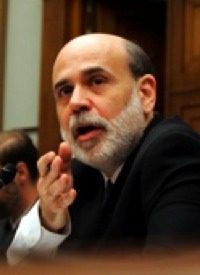
Federal Reserve Open Market Committee Chairman Ben Bernanke is pulling out all the stops to kill Congressman Ron Paul’s legislation to audit the Federal Reserve Bank, this time with a November 29 op-ed column in the Sunday Washington Post.
“I am concerned, however, that a number of the legislative proposals being circulated would significantly reduce the capacity of the Federal Reserve to perform its core functions,” Bernanke wrote, adding that "a House committee recently voted to repeal a 1978 provision that was intended to protect monetary policy from short-term political influence.”
Ron Paul’s legislation, H.R. 1207, recently passed the House Financial Services Committee, and a majority of the whole House (307 of 435) have cosponsored the overwhelmingly popular bill. The legislation would require the Government Accountability Office (GAO) to audit the Federal Reserve annually and disclose the results to the public. Bernanke opposes the audit while at the same time claiming that the Fed is adequately audited:
In its making of monetary policy, the Fed is highly transparent, providing detailed minutes of policy meetings and regular testimony before Congress, among other information. Our financial statements are public and audited by an outside accounting firm; we publish our balance sheet weekly; and we provide monthly reports with extensive information on all the temporary lending facilities developed during the crisis. Congress, through the Government Accountability Office, can and does audit all parts of our operations except for the monetary policy deliberations and actions covered by the 1978 exemption. The general repeal of that exemption would serve only to increase the perceived influence of Congress on monetary policy decisions, which would undermine the confidence the public and the markets have in the Fed to act in the long-term economic interest of the nation.
But earlier this year in Congressional testimony, Bernanke and other Federal Reserve auditors claimed they didn’t know precisely how the Fed had added half a trillion dollars in assets (debts) to its balance sheet. The $500 billion in loans, Bernanke then told Florida Democrat Alan Grayson, were loans made to foreign central banks at the same time American businesses and homeowners were struggling to get loans. Bernanke has decried the possibility of congressmen and citizens being able to look into the books of the U.S. central bank and see transactions like the one above. “These measures are very much out of step with the global consensus on the appropriate role of central banks,” Bernanke said of the Paul bill, “and they would seriously impair the prospects for economic and financial stability in the United States.”
Bernanke argues that his goal is “to design a system of financial oversight that will embody the lessons of the past two years and provide a robust framework for preventing future crises and the economic damage they cause.” But the Fed’s loose monetary policy of suppressing interest rates over the 2003-07 period was the primary cause of the housing bubble/bust cycle. Even Bernanke has admitted that the Fed failed in its supposed responsibility to prevent the monetary crisis of 2008: “The Federal Reserve, like other regulators around the world, did not do all that it could have to constrain excessive risk-taking in the financial sector in the period leading up to the crisis.”
But Bernanke’s solution to the current crisis is to continue and even accelerate the unparalleled increase in money supply that will lead to new bubbles and dilute the value of already-existing dollars, causing prices to rise. “To support economic growth,” Bernanke noted in his column, “the Fed has cut interest rates aggressively and provided further stimulus through lending and asset-purchase programs. Our ability to take such actions without engendering sharp increases in inflation depends heavily on our credibility and independence from short-term political pressures.” The result of these rate cuts — the Federal Reserve’s target interest rate is now set to zero — the Fed has more than doubled the supply of money in the last year, and the rate of increase in the money supply has been called a “hockey stick chart” by opponents of the Federal Reserve policies.
Photo of Ben Bernanke: AP Images



